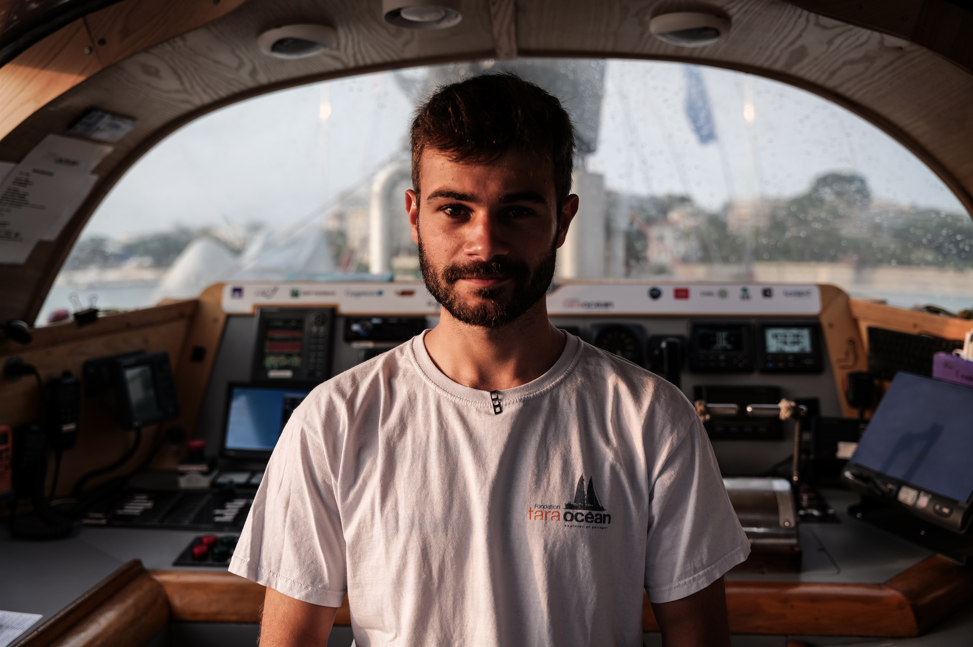Interview with Martin Alessandrini – FTO

Martin Alessandrini – FTO
Welcome to the “Blue Biome Boffins” Campaign where we interview different participants in the BlueRemediomics project, from Early Career Scientists to Senior Researchers, to learn more about their role and valuable work in making this project a success.
Martin Alessandrini works for the Fondation Tara Océan (FTO, France), where his work focuses on ocean advocacy and international cooperation. For the BlueRemediomics project, he is involved in Work Package 6, which focuses on communication, dissemination, outreach, and exploitation of the project’s outcomes and key exploitable results (KERs). Martin and his colleagues work more specifically on Task 6.3 focusing on Outreach.
In this interview, we talked about why ocean advocacy is essential to better protect the environment, how FTO is involved in the project and what Martin would like to do after the project is over.
How did you become interested in the field of ocean advocacy and science to policy?
Martin Alessandrini: Actually, when I began working with the ocean, it wasn’t the part I was first interested in. I mainly studied to become a researcher, and I did all my studies and internships in ocean biology. But even though I was super interested in research and how much we still did not know about it. I was always more interested in how we could use all the knowledge and science to try and protect the ocean to better manage it so that the biodiversity is protected (it’s mostly unknown actually, we know a big part of the ocean but we don’t really know what it is and how it works, and how we can use all of this knowledge to better protect it).
What are your primary interests in the ocean advocacy work?
Martin Alessandrini: I would say that it is linked to what I said above. I’ve always wanted to work on something related to the ocean. At first, I was mainly interested in doing the research but now I am more interested in finding the most efficient ways to protect the ocean. I think understanding the role of the ocean microbiome is crucial for protecting the ocean. By incorporating microbiome data into our management and protection tools, we can create solutions that are significantly more precise and effective in protecting marine ecosystems. I also find it super interesting to advance knowledge not only in management and protection tools but also in areas that could lead to groundbreaking discoveries for society—such as innovations in medicine.
Can you describe your role in the BlueRemediomics project?
Martin Alessandrini: So, I work for the Tara Ocean Foundation. There’s no scientist in Tara; we build scientific projects with other laboratories; we try to help them share their discoveries to the general public and see how they’ll help decision-makers. Our role in the project is trying to create a dialogue between the researchers and society.
What’s the most exciting aspect of your work in the project?
Martin Alessandrini: The most exciting aspect is achieving to pass on all this knowledge from researchers to society, I think it gives even more purpose to science. It’s not only shared within the scientific community, but it goes to society in general.
Have you had any important milestones as part of the project?
Martin Alessandrini: It’s always a long journey from discovery to practical application in society but I think having the BlueRemediomics project is a success in itself for the policy and outreach parts. When the FTO started being involved in microbiome research, the work was only on an inventory of the microbiome and trying to understand what it does, but we didn’t know anything. Having projects like the BlueRemediomics one which has many concrete impacts for industries is a success for the microbiome research field.
Could you describe the science to policy workshops and their purposes?
Martin Alessandrini: The first two years of the BlueRemediomics project linked with our TREC (TRaversing European Coastlines) Expedition which we conducted with European Molecular Biology Laboratory (EMBL). We had several stopovers during the expedition, during which we did several science to policy workshops, enabling a dialogue between researchers from the project and local decision-makers. We tried to address several subjects like the eutrophication of the Baltic Sea or ethics in science.
Where do you see yourself after the project ends?
Martin Alessandrini: Well, the FTO is super interested in decision-making tools like the Ocean Microbiome Health Index that is being developed in the project. Those tools help our understanding of where we need to go to better protect the ocean, they’re some of the key results we’ll still be exploring after the project ends.
Do you have any advice for the people interested in getting into the ocean advocacy and policy fields?
Martin Alessandrini: First, I think we need more and more people to do this job because we see that with the biodiversity and climate crisis, there’s a huge need to help and accompany scientists in sharing their work because there is so much good work that is being done and that could help us a lot in correctly addressing all these issues. There’s more and more need for people to engage in ocean advocacy. I would say that people need to investigate a career in this field, it’s very interesting to be this point of dialogue between these two parts of society that really need to be better connected.
